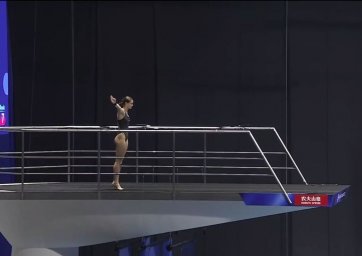Ana Carvajal, corkscrew goal
The jumper, already qualified for the Paris Games in 10 m platform jumps, is focused on introducing a fifth and competitive exercise.
With one jump left to finish the final of the 10 m platform at the last World Championships in Fukuoka, Ana Carvajal was third. Only surpassed by the Chinese, who live in another galaxy, Yuxi Chen and Hongchan Quan, the one from Villanueva de la Cañada (Madrid), with the Olympic ticket under their arm («I didn't expect it. When I finished the contest, everyone told me, do you know what you've done? I didn't know that I had already qualified for Paris 2024″) I had no podium options, as paradoxical as it may seem. Her fifth and final jump was 2.1 difficulty, the lowest of all the finalists. Even if she did perfect, her score would be minimal. She finished eighth.
At 16 years old, with meteoric growth in the last season, Carvajal did not have a complete program prepared, and now with the necessary time and without the burden of the pass for Paris 2024, he focuses on perfecting that last jump. “I'm working on the corkscrew. The difficulty is 3. I think it will give me time to assimilate it,” he explains. The Second High School student in the Technological modality, who faces a course with the Selectivity and the Games, must do the right start, correctly give the kick that helps her “finish the corkscrew late” and “not come up short” in order to be able to nail the entrance to the water.
Carvajal's growth cannot be understood without the arrival of Cuban-Canadian coach Arturo Miranda, who „has a clear method, works with few jumpers and has helped us improve technique.“ The Spanish diving team did an excellent job in Fukuoka, with a fifth place, a seventh and an eighth place in three disciplines. Carvajal herself has the challenge of synchronized 10m platform jumps with Valeria Antolino. “We train six hours a day,” says the Madrid native, who despite starting out swimming, jumping quickly caught her attention.
In Villanueva de Cañada (“life there is very village”), Carvajal was amazed when he saw the jumping group perform those figures in the air. “I saw it as fun and I told my coach, Emilio Ratio, that I wanted to try.” She was still a child and she was enthusiastic, they saw ease in her, although she also went through some moments of doubt: “Things started to go wrong for me, I cried a lot and I was about to quit and go to gymnastics, but my parents helped me.”. Among other things, they are in charge of taking her to training every day at the Madrid-86 pool (50 minutes from her house). “My father played handball,” says Carvajal, who lives the life of a teenager and when he gets bored at home he watches videos of Chinese jumpers: “His secret is to train a lot, they do it all day. They have a very good base and their body helps a lot, they are thin and short. “Everyone is training.”
In a season full of competitions, with the starting point at the Madrid Grand Prix in December, Carvajal is transformed in the competitions. The technicians who know her emphasize her coolness and tranquility when jumping, although she, who recognizes that she does not have rituals before competing beyond watching a video of the jump she must perform, shies away from that power: “I'm not always so constant, either. I do so well in training; but then I don't get so nervous, I get into competition mode.” Or corkscrew mode, the leap she has left to dream of everything (and not counting China) in her program.
